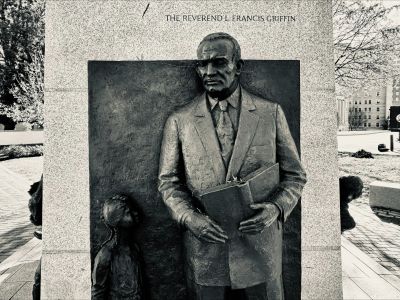Resisting Massive Resistance
On Saturday, May 4, 2024, we invite you to attend “Resisting Massive Resistance: Memory, Forgetting, and the Modern Education Rights Movement, 60 Years After Griffin v. Board, 70 Years After Brown v. Board.”
This half-day symposium, held at the Jefferson School African American Heritage Center in Charlottesville, will forefront how Black Virginians utilized the judicial system to defeat Massive Resistance and expand democracy and civil rights in education. The commemorative event will also use the U.S. Supreme Court’s 1954 Brown v. Board and 1964 Griffin v. Board decisions as entry points into a broader consideration of how Civil Rights Era collective memory permeates education today.
This symposium is especially relevant for K-12 educators teaching Virginia Studies, US I, US II, VA-US History, and VA-US Government. Participating teachers will engage in collaborative discussions on how to use personal narratives associated with these cases as primary sources in their classrooms and will receive a certificate of completion at the conclusion of the conference.
"Resisting Massive Resistance" is supported by various partners, including the President's Office, Carter G. Woodson Institute for African-American & African Studies; the Center for Liberal Arts, Center for Race & Public Education in the South; Center for the Study of Race & Law; Division for Diversity, Equity, & Inclusion; The Equity Center; Jefferson School African American Heritage Center, and the Memory Project at the Karsh Institute of Democracy.
Background
May 2024 will mark not just the 70th anniversary of Brown, but also the 60th anniversary of the pivotal but less publicly remembered Griffin decision. Considered one of the Court’s most consequential post-Brown education rulings, Griffin safeguarded U.S. public education by outlawing Massive Resistance privatization policies used by segregationists to defund and close public schools.
Resisting Massive Resistance will look both at the history and memory of the Civil Rights struggle for equal education, and toward the future. At a time when support for U.S. public education feels more precarious than ever, this symposium will bring together educators, scholars, and Brown and Griffin descendants, to examine the past and future of race, law, and equal education.
Speakers and Participants
Dr. Derrick Alridge
Founding director, UVA Center for Race & Public Education in the South
Joan Johns Cobbs
Brown v. Board student plaintiff and sister of 1951 Moton Student Strike co-leader, the late Barbara Johns Powell (featured on the Virginia Civil Rights Memorial on Virginia’s Capitol Square)
Dr. Candace Epps-Robertson
professor of English, UNC Chapel Hill; author, Resisting Brown: Race, Literacy, and Citizenship in the Heart of Virginia
Leslie “Skip” Griffin Jr.
Griffin v. Board student plaintiff and son of the late Rev. L. Francis Griffin Sr. (featured on the Virginia Civil Rights Memorial on Virginia’s Capitol Square)
Justin G. Reid
Visiting scholar, UVA Memory Project; nephew of Griffin v. Board plaintiff Warren Reid
Kimberly Jenkins Robinson
Founder & director, UVA Education Rights Institute; director, UVA Center for the Study of Race & Law
Dr. Jalane Schmidt
Director, UVA Memory Project
Dr. Jeanne Theoharis
Political science professor, Brooklyn College; author, A More Beautiful & Terrible History: The Uses & Misuses of Civil Rights History
Dr. Amy Tillerson Brown
History department chair, Mary Baldwin University; state education chair, Virginia NAACP
Cainan Townsend
Executive director, Moton Museum; great-grandson of Brown v. Board parent plaintiff John Townsend
Anna Yonas
PhD candidate in curriculum, instruction & special education, UVA School of Education
Tentative agenda
9:00 - 10:00
Coffee & Continental Breakfast
10:00 - 10:15
Welcome, Opening Remarks & Keynote Introduction
10:15 - 11:00
Keynote/Q&A: Jeanne Theoharis
11:00 - 11:15
Break
11:15 - 12:45
Introduction
Panel/Q&A on history, memory & myths; Moderator: Derrick Alridge
12:45 - 2:00
Lunch
K-12 Educator Roundtables; Facilitator: Anna Yonis
2:00-2:50
Introduction
Closing Panel/Q&A: Kimberly Robinson in conversation with Joan Johns Cobbs & Leslie Griffin Jr.
2:50 - 3:00
Closing Remarks
